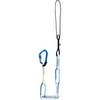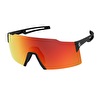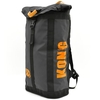Cristian Brenna

 1 / 4
1 / 4 Luca Lozza
Luca Lozza
Cristian Brenna has established himself as one of the world's top sports climbers, competing at the highest levels and making swift repeats of some of the hardest routes around. We decided we could no longer afford to leave him unnoticed.
Our idea was that of a theoretical journey from the crag to competitions, via isolation areas and intense training sessions, technique and stamina. And who better to have as a guide?
Cristian is crazy about climbing and he accompanied us enthusiastically, tirelessly, in between one coffee and the next cake.
This is the result: a brief profile based on his thoughts, followed by an interview and an (extremely impressive) curriculum vitae - don't miss it, because it shows just how good he really is…
TRAINING
My strongpoint is my endurance. Other Italians such as Cristian Core, Luca Zardini and Mauro Calibani are far more powerful than me. From what I've seen the Italians are incredibly strong compared to other climbers, but they lack competition experience. I've always been very serious when it comes to climbing, always very methodical and I've always trained hard. I started in 1988 using a pull-up bar, then in 1991 we built a wooden board to train on.
I didn't manage to organise a real training method until '95. I used to go to the wall 3 times a week to work on my endurance. I kept a record of everything I did: every evening I repeated the same circuits, doing 500-600 moves for 5 years. I never bouldered, occasionally I worked out using a pull-up bar. Then one day a friend of mine, Marzio Nardi, gave me a training plan… tables, weeks of high intensity bouldering, followed by rest weeks, then endurance training, power training etc. The results then started to appear. What really helped me was climbing on rock because my technique was my weakpoint. It didn't improve on the wall and climbing outside at the weekend just wasn't enough. It wasn't that important for the crag, but more for competitions, because the holds are obligatory and so you have to be that bit better.
COMPETITIONS
"I think I'm the only Italian who's won a World Cup event (Courmayeur 1998) and who's also placed last in the Italian Cup (1990)!"
I started to compete in 1989 in Turin. I placed 27th and I remember that there were three routes to be flashed, so you had a couple of goes. At that time there were no alternatives to this formula: either you competed on a national level, or you didn't compete at all. Regional comps didn't exist and neither did ones for amateurs. At Trento in 1990 the competition consisted of a single on-sight route and I placed 15th - so my results were encouraging right from the start.
Competitions are stressful, but I like that. Being in isolation takes ages though. You feel the pressure less when you go just to gain experience. But when you go to get a good result, the wait never ends!
TECHNIQUE
Perhaps my climbing style didn't look that good in the beginning, but it was efficient! My first hard routes were all vertical: my first 7c+ was Liquer de Coco in Verdon, my first 8a was Apache in Cornalba and my first 8a+ was Outsider, all of which are fairly technical. Perhaps the way I climbed them was fairly brutal though….
BOULDEING
I enjoy bouldering competitions, but I prefer normal competitions which I feel are more complete, in a sense "harder' and more demanding. In bouldering comps even if you fall you get another go, you have 6 minutes to sort yourself out.
It's harder to train for normal competitions, much more complicated. To train for power you need to train for 2-3 hours a day and that's it, then all you do is rest. Endurance training is completely different: 3 hours in the morning, 3 in the afternoon, for 3-4 days without a break.
I really enjoy bouldering outdoors: I've been to Fontainebleau, to Cresciano and Meschia. I go in winter when conditions are good and I can get up an 8a. I do about 60 problems in a day, instead of trying the same boulder problem again and again. I just can't do this, because the whole thing is a game and I enjoy going from one boulder to the next. I saw Fred Nicole at Cresciano - he doesn't climb anything! He tries a problem, then rests for 20 minutes, tries again and rests for a further 20 minutes. I get bored doing that. I try one, then move on to the next.
You represent the athletes within the F.A.S.I., the Italian Climbing Federation...
Yes, I was elected about three years ago, after a new law by the governing body stated that each federation needed a representative elected either by World Cup or Olympic athletes. Climbing isn't an Olympic sport so only those who had competed in the World Cup were eligible to vote, and they elected me as their president, Luca Zardini as Vice President, and Luca Giupponi as Adviser.
You are regarded by many as charismatic…
I'll let the others comment on that. I enjoy this job and I try to carry it out as well as possible. Of course there are some people who find things to criticise about, but that's useful for us to move on. Every year Zardini, Giupponi and I write a report for the Federation about the competition season and about the National Team. We mention what worked and what didn't and we suggest ways to improve things. I also take part in all the Federal Advisory meetings, to hear their new ideas. So it's a job that means you can have your say.
What issues are important?
Above all I'd like the Federation to publicise our sport more. There are other things that need working on though, such as improving isolation areas, which in general are inadequate, and improving the quality of the competition walls and the routes themselves. Another proposal is competition prizes in the Italian Cup. Until now these haven't been obligatory, and although we're not after a lot of money it does seem fair that the finalists at least get their expenses paid for.
Sports climbing nowadays has reached such high levels that it requires professional athletes. How do you manage this?
At the moment it's a bit difficult to live off climbing in Italy. We're lucky though because the army sports groups offer the chance to become professional athletes. There are six of us at the moment and perhaps there'll be more this year. So that's something positive. I hope to continue this rapport even after I've stopped competing, perhaps as trainer. This happens in other Federations, like the Italian Skiing Federation, since it's a good to have professionals who develop the youth sector.
How important is it to have a trainer?
If he follows the athletes on a weekly, not necessarily daily basis, then the trainer becomes indispensable. But reality is different here in Italy and so instead of having a trainer only once a month we asked the Federation for a physiotherapist who now helps us recover after competitions and prepare for the next one.
But you didn't have a trainer in the beginning…
No, like all those of my generation, I'm self-taught. Zardini, Giupponi, myself and many others share advice, try different training methods and see what works best. Even though it's true that one person's training method doesn't necessarily work for someone else. For example, when Marzio Nardi worked as adviser to the Federation he devised a training plan for the entire team: one of the exercises worked well for Zardini, but it didn't work at all for me. So in the end we try to work out what's best for us, to find a method that best suits the individual.
Can you describe a typical training day?
It depends on the time of year. Winter is the preparation phase and consists of high intensity workouts: a typical day may be 2-3 hours on the board in the morning, followed by a weights session in the gym and then another session on the board in the afternoon. When I prepare for competitions I always do some weights first because I tend to lose muscle easily and in the afternoon I have a session on the wall. Immediately before the competition I concentrate on "quality", with just one session on the board which lasts between 2-3 hours. I climb fewer moves, perhaps only 2 or 3 circuits, but with plenty of rest between each one, to see if I'm on form. I always do some form of aerobic workout - usually cycling. I also do some stretching... although not that much because I don't really like it.
Do you do anything to improve your concentration?
I don't do any specific training for this but I do exercises to improve my technique and tactics. I try to work on my memory by doing long circuits, and I also try to simulate the moment we have to check out the route. When I'm at a friend's house I get him to show me a circuit once and then I try to repeat it without being told where to go.
Right. Let's see, what can you remember about your first 8b on-sight?
My first 8b on-sight was "Australia" at a crag called Ceredo, in Italy, but I can't really remember very much about it. There's a large bucket beneath the roof which is a semi-rest, then you continue up a series of small crimps. The hardest section for me was leaving that rest, since that's where the crux is. I find it hard to remember routes I've on-sighted, while competition moves are easier to remember. One of the hard things about competitions is working the best place to clip, or where the best place is for your feet. And it's really important to see if there are any possible rests on the route.
So what happens in those crucial few minutes before the competition while you examine the route?
I quickly study the route, mime the moves and try to understand where to clip from and where to rest. I concentrate more on the upper section than the first half, because there are rarely hard moves low down.
Do you know all the holds?
No, and that's why we sometimes use binoculars. Compared to the French we usually have a hard time on the Entreprise walls. This is something the UIAA will have to look into, because there are some athletes who design holds and panels and then go and compete on them. This isn't their "fault", on the contrary, but there's no doubt it's an advantage and perhaps not fair on the others.
When you're checking out the route with the others, is there anyone you trust most?
In the end I trust myself most. Usually you look at the route in groups of two or three and when you then go into isolation you all talk about the route to try and clarify things. That's really nice. Those who have to climb immediately usually don't have enough time to work things out completely, but those who start later have time to discuss things with the other members of the group. There's always something about the route that isn't clear, so you ask the others "and what about those moves…"
Have you ever been misled by anybody?
Possibly sometimes, but certainly not on purpose. For example, once François Petit was sure that a move had to be done in a certain way, while I said the opposite. In the end he fell on that move. Perhaps if I'd listened to him I would have fallen too. Everybody has their own climbing style, even if in competitions it looks as if they all climb in the same way. But if you examine the video afterwards you notice that they aren't all the same. There might only be minor differences, but they change everything. This is true above all for the men, where the level of the best climbers is very similar. There's no one at the moment who is way better than the rest. If you look at the World Cup results the top 20 could potentially all reach the Final.
Apart from this, what else happens during isolation?
Every now and then there are some informal boulder competitions. And then there's the Ukranian Evgeni Krivocheicev who devises a circuit for all. He arrives with some chalk, marks the holds, and off we go…
And do you all take part?
It depends on what he sets. Sometimes he does things that are too hard, with about 60 moves. When I warm up I do 30 moves max. He completes the entire circuit because he does killer warm-ups!
Has anyone ever done the hardest boulder problem during isolation and then immediately fallen off the route?
Yes, but this doesn't usually happen. When someone is inexperienced it's hard to know when you've warmed up properly - it happened to me in the beginning. There are some climbers, like Arnaud Petit or Luca Zardini, who need to get really pumped during the warm up, but as soon as I feel a bit tired I stop.
You look like you're in a trance before you start up the route. What do you think about?
You try to memorise all the moves, the holds and footholds - you think about nothing else but the route ahead of you.
And do you ever think about the route once the competition is over?
Every now and then I look at videos of old competitions to see what I did wrong and to compare myself with the others. Videos are really useful.
How much do nerves influence your performance?
Everybody feels the pressure, although some feel it more than others. You have to try and transform it into positive energy, a bit of "aggression" for the route - but that's hard.
Do you manage?
It's strange but it depends on the competition: sometimes you're fine right until you start to climb, while other times you're excited during isolation and then when you climb you're really calm. It's difficult. In some competitions I failed to do my best because I was too tense. In Courmayeur in 1996 I lost because I was too tense and eventually placed second in the World Cup, the same happened in Milan two years ago.
Can you work on this aspect?
We all try to reduce tension in some way or other, but there's no standard technique that makes it disappear. During training it's difficult to simulate the same competition atmosphere. Perhaps I should do something to train my mind, something like yoga. I know that Yuji Hirayama does autogenous training.
Do you consider yourself to be cool or hot-headed?
A bit of both. I still haven't found the best method to stay calm during competitions. I rarely feel tense during national competitions, but in international comps it varies. Things have improved a bit lately and I'm getting a bit calmer.
But outside of competitions how would you describe yourself?
Relatively cool-headed
Who is the calmest in competitions?
Definitely François Legrand.
And who suffers the most?
Christian Bindhammer gets fairly nervous - in competitions he literally trembles, and this never happens to him outside. Of the Italians there are Luca Zardina and Alberto Gnerro, who's really strong but gets hyper worked up. He's more powerful than anyone else I know and he still has the potential to win some World Cup events. It's just that he gets really nervous.
What does the crag represent to you? Is it complementary to or in contrast with competitions?
I'm not capable of only climbing indoors, I need to climb outside - if I don't I can't climb well. It helps my technique, tactics, rhythm… and I can let off some steam!
What's more important, a good route or a good competition result?
I take part in competitions so a good competition result is far more important than climbing a hard route. But of course I also like to climb hard routes - I seem to do them quite easily, perhaps because I'm relaxed and don't have any competition pressure to worry about.
So a good competition result is more important than an 8b on-sight?
For me, yes, because I do competitions. I get more satisfaction out of winning a World Cup event then doing an 8b on-sight. But it has to be said that on-sighting an 8b is always a great feeling. Winning a competition is the main objective though and the crowning achievement.
Are you interested in doing any new routes?
This hasn't interested me yet, especially because when I was an electrician I worked with a drill all day and I can't bare the sight of them any more! I haven't found a line that inspires me here in Lombardy, but perhaps if I find one then I'll start to clean and work it. Also because once it's done, it remains for all to see and do.
Italian climbers seem to lack the determination which English or French climbers show. What do you think about this?
I reckon there are many climbers in Italy who are still afraid of falling and consequently that blocks them psychologically, whatever level they climb at. I've noticed on the wall where I train that as soon as someone is a bit tired he or she gives up, instead of pushing on or searching for other solutions which could help on a route or in competitions. This is what training is all about, to try to overcome one's limits. Perhaps Italian climbers lack this "characteristic", perhaps they lack a bit of grit and determination.
Is there a distinctive French or Italian climbing style?
Italian climbing concentrates more on power than technique, and so it differs greatly from the French style which is renowned for its technique. For the last couple of years I've worked more on this than on power, because it was one of my weakpoints, along with my tactical ability. This means that I climb a lot on vertical walls and try to transfer as much weight as possible onto my feet, even when I'm on the on the smallest holds.
On overhangs I try never to cut loose and lose my footholds. This really helps in competitions - if you can transfer your weight from your hands to your feet, then you can really rest. Two years ago, at Rock Master in Arco, François Legrand, Yuji Hirayama and François Lombard all reached a huge hold where they put in a knee-bar. Yuji and Lombard were tense, while Legrand looked as if he was sitting down. It was if he had said to himself: "right, I've got a knee bar and now I'll relax".
Last year Legrand bridged out to a massive stalactite beneath the roof at Lipsia: was the only one to see the rest and it helped him win the competition. At the end of the day all of these things add up, he has something more than the other athletes, a certain ability that the Italians are lacking.
If you had to talk about climbing to someone who knows nothing about it, what would you say?
That it's a wonderful sport because you climb outside and you're in touch with nature. I would try and convince the person to climb outside, not just indoors.
So why should someone take part in competitions?
Because if you like to compare your ability with that of other climbers, then it's only right to do it in a competition. It's true that results at the crag count, but the most precise way to confront your ability with that of the others is in a competition. Conditions are equal for all, and it becomes obvious who is the best, at least on that particular day. Out at the crag someone can on-sight an 8b, while another person may take three goes to redpoint it. This doesn't necessarily mean that the first is better. You have to see if all the influencing factors, not just atmospheric conditions, were the same.
And in competitions there is the crowd who can see everything!
Yes, although at the crag people can see everything too. Even though there's never anyone there, everyone sees something…
So what would you say about sports climbing?
That it's a lovely sport and very demanding, and that in the beginning one should concentrate less on the grade but more on climbing as an art. Especially in the beginning one should climb to have fun - later on grades come as a result of this.
One shouldn't start off with the fixed idea of having to achieve a certain grade: there are many young climbers who skip 7a, 7b or 7c and jump onto an 8a or 8b, and this is completely wrong.
Climbing outside is also a way to relax, especially for those who want to do well in competitions. We're lucky, because this variety doesn't exist in other sports.
What is your ambition in climbing?
I would like to on-sight an 8c+ - this is my dream and main target at the moment. I've already identified a route, 'Il calvario del sicario' at Cuenca. I prefer to on-sight routes than work a really hard project, because on-sighting is the essence of climbing. At least, that's the way I interpret climbing. Working a route for a year is more like gymnastics. You have to keep at it, try and try again. A bit like the working on the parallel bars, you have to keep on trying untill you do it. So this has less to do with climbing but more to do with an athletic achievement.
I find I get really motivated when it comes to on-sighting a hard route or repeating one quickly, because that's my way of interpreting climbing. This isn't necessarily the only way though.
| Cristian Brenna nationality: Italian age: 29 AMember of the Italian sports climbing team Competes for the "Gruppo Sportivo Sciatori Fiamme Gialle " Best sport routes: In total 236 routes graded 8a or harder, 96 onsight. |
||
|
redpoint
|
crag
|
attempt |
| 8c+ | ||
| Hasta la vista | Mt. Charleston - USA | 12 |
| L'Avaro | Sarre (AO - ITA) | 11 |
| La connexio | Orgon - FRA | 08 |
| Bronx | Orgon - FRA | 12 |
| Noia | Andonno (CN - ITA) | 10 |
| 8c/8c+ | ||
| Rheini's vibes | Massone (TN - ITA) | 03 |
| 8c | ||
| Facile | Mt. Charleston - USA | 03 |
| Reverse polarite | Mt. Potasi - USA | 02 |
| Last sacrifice | Deversè - FRA | 03 |
| Hasta la magnana | Mt. Charleston - USA | 06 |
| Hyperman | Mt. Charleston - USA | 03 |
| Nagay | Covolo (VI - ITA) | 02 |
| Invidia | Donnaz (AO - ITA) | 07 |
| Mistero | Andonno (CN - ITA) | 04 |
| La cura plus | Gravere (TO - ITA) | 08 |
| Le plafond | Volx - FRA | 04 |
| Macumba club | Orgon (FRA) | 05 |
| Zulu | Rifle - USA | 04 |
| On-sight | crag | |
| 8b | ||
| Public Enemy | ||
| ? | Georges du Tarn (FRA) | |
| Sika | Defersé (FRA) | |
| Fuego | Massone (TN - ITA) | |
| Ghegori | Covolo (VI - ITA) | |
| Ridi mò | Grotti (RI - ITA) | |
| Rastata | Grotte de l'ours (FRA) | |
| Australia | Ceredo (VI - ITA) | |
| 8a+/b | ||
| Il Falco | Brojon (VI - ITA) | |
| Best competition results: 1995 - 9 World Cup - 1 Italian Championship - 1 Italian Cup 1996 - 3 World Cup - 6 European Championship - 1 Italian Cup 1997 - 4 World Cup - 2 Rock Master di Arco 1998 - 2 World Cup (1ist Italian to win a stage of the World Cup- Courmayeur 5/6-09) - 2 European Championship - 1 Italian Championship - 1 Italian Cup 1999 - 1 Master Serre Chevalier (FRA) - 3rd at Wiener Neustadt (1st stage of the Lead World Cup 1999) - 2 Italian Cup - 2 Italian Bouldering Cup - 1st in Permanant Wolrd Ranking 16/10/99. - 1 Italian Championship |
||
| Sponsor: Fila (clothing) La Sportiva (climbing shoes) Camp (gear) Oakley (sunglasses) Longoni Sport (sports shop) Gaz Max (climbing wall). |
||



 Copia link
Copia link
























